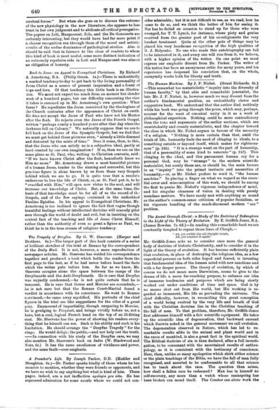Back to Jesus : an Appeal to Evangelical Christians. By
Richard A. Armstrong, B.A. (Philip Green. ls.)—There is undoubtedly a marked tendency to-day to get back to the living personality of Jesus Christ as a source of present inspiration and a fount of hope and love. Of that tendency this little book is an illustra- ;ion. We must not expect too much from an earnest but slender work of a hundred pages, but our difficulty concerning the view it takes is summed up in Mr. Armstrong's own question : What Jesus ? He repudiates the Jesus conceived by the theologians of she Church centuries after the appearance of Christ on earth. He does not accept the Jesus of Paul who knew not his Master after the flesh. He rejects even the Jesus of the Fourth Gospel, written "perhaps nearly a hundred years after that day when the darkness fell on Calvary." We naturally suppose that we are to fall back on the Jesus of the Synoptic Gospels, but we find that we must get behind these pictures even, "already a little dimmed and distorted by the mists of time." Does it come, then, to this, that the Jesus who can satisfy us is a subjective ideal, partly at least created by our own imagination ? If so, then we are on the same plane as St. Paul, who, writing to Christian converts, said : " If we have known Christ after the flesh, henceforth know we Him no more." Mr. Armstrong draws a most beautiful picture of a human Jesus, tender to the Binning and sorrowful, but this gracious figure is alone known by us from these very Gospels behind which we are to go. It is quite true that a resolute endeavour to live the life of Christ, or, as St. Paul put it, to be "crucified with Him," will open new vistas to the soul, and will increase our knowledge of Christ. But, at the same time, the basis of that knowledge must be for all of us the record of th' Gospels, and of the few sayings contained in the undoubted Pauline Epistles. In his appeal to Evangelical Christians, Mr. Armstrong is too inclined to ignore the fact that vague though beautiful feelings without intellectual doctrine will scarcely pilot men through the world of doubt and evil, but in insisting on the central fact of the teaching and life of Jesus Christ Himself, rather than the authority of even so great a figure as Paul, we think he is in the true stream of religious tendency.






















































 Previous page
Previous page